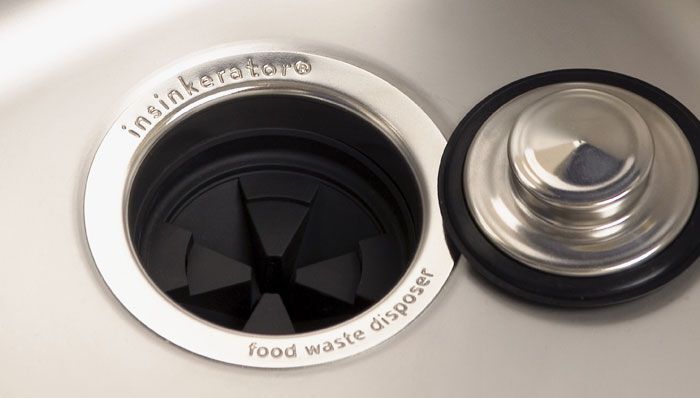Call This Friday to Get $50 OFF
Call This Friday to Get $50 OFF
Call This Friday to Get $50 OFF
Call This Friday to Get $50 OFF
Garbage disposals are an indispensable appliance in any kitchen, making it simple to discard food scraps quickly and efficiently. Unfortunately, when your garbage disposal starts making too much noise, it can be frustrating. There are various reasons your disposal may be making noise; and before you call a plumber for garbage disposal repair, read on for some insight into the possible noises. High Speed Plumbing is available for any repairs you need.

If your garbage disposal is making a humming or whirring noise, it could be due to a stuck flywheel. The flywheel is part of the disposal that grinds up food scraps, so if something gets lodged inside it, you may find that resetting it solves this problem. First, turn off the power at the circuit breaker for disposal then manually turn the flywheel back and forth using a hex wrench; this should dislodge any food particles causing them to stick. Finally, turn back on the power to test to see if the noise has stopped.
Another possible cause of humming or whirring could be an unresponsive motor. If the motor isn't working correctly, noise could be coming from it as it tries to run. In such cases, replacing your garbage disposal may be necessary.
If your garbage disposal is rattling or loud grinding noise, it could be due to loose blades. Over time, these blades can become loose in your disposal unit, causing it to rattle around inside. To fix this problem, first, turn off the power at your circuit breaker then use a wrench to tighten the mounting bolts holding the disposal in place. Afterward, turn back on the power and test to see if the noise has stopped.
If the blades are not the issue, the noise could be due to a worn-out or damaged impeller. This part of the disposal grinds up food scraps, and it is subject to damage over time; if this is the case, it may be time for you to replace your garbage disposal.
If your garbage disposal makes an unusually high-pitched squealing noise, it could be due to a bearing issue. Bearings help the motor run smoothly, and if they become worn or damaged, this can cause a squealing sound. To resolve the problem, you may need to replace the bearings; however, this repair requires professional assistance from either plumbers or electricians and is more complex in nature.
If you're hearing a rumbling sound from your basement, don't ignore it. At High Speed Plumbing, we've seen everything from thermostat…
Running out of hot water at your business can mean angry customers, health code violations, or a full operational shutdown. Restaurants,…
Are you dealing with a leaky faucet, low water pressure, or a broken handle? If so, you might need a faucet…
A properly working garbage disposal makes kitchen cleanup easy and efficient. If your disposal is acting up—making loud noises, leaking, or…
When your main water line has a problem, it can cause a lot of trouble for your home. Leaks, low water…
Are you dealing with an old, leaky, or broken toilet? If so, it may be time for a toilet replacement in…
If you’re concerned about the quality of your water, water filtration installation in Pomona is a wise choice. A good filter…
Traditional snaking or chemical drain cleaners can harm pipes and aren’t always effective at reaching deep blockages…
While some garbage disposal sounds may need professional repairs, there are preventive measures you can take to keep your disposal running smoothly and avoid future issues.
One crucial step when using the disposal is to avoid placing certain items down there. Fibrous foods like celery or artichokes, as well as challenging items like bones or fruit pits, can damage the blades and impeller of a disposal unit if not disposed of in the trash instead.
It is essential to run your garbage disposal regularly. Running it for a few seconds after each use can help prevent food scraps from piling up, leading to clogs or other issues.
Regular cleaning can help your garbage disposal stay running optimally. Pour a mixture of ice cubes and salt down the drain, then run the disposal for several seconds to clear any buildup on the blades or impeller. This method works best when doing this at least twice annually.
Finally, having your garbage disposal regularly inspected and maintained by a qualified plumber or electrician is highly recommended. Regular checks can help identify any potential issues before they escalate into major issues.
To avoid future issues and maintain your garbage disposal, be mindful of what goes down the drain, run it regularly, clean it regularly, and have it inspected and maintained by a professional. By taking these steps, you can keep your disposal running efficiently and quietly for years.
It is essential to be aware that fixing a garbage disposal yourself can be hazardous, as it involves working with electrical and mechanical components. If you are unfamiliar with such repairs, it's best to enlist the assistance of an experienced plumber or electrician for guidance.
In conclusion, a noisy garbage disposal can be an annoying annoyance, but there are several potential causes and solutions.
Understanding the potential causes and taking preventative measures to maintain your disposal will ensure it runs quietly for years to come. If you are uncertain how best to address the issue, don't hesitate to seek professional assistance from someone knowledgeable.
If you are experiencing issues with your garbage disposal, don't hesitate to contact High Speed Plumbing for assistance. Our team of skilled plumbers and electricians can diagnose and repair any issues you may be experiencing, from stuck flywheels to worn-out impellers. With our expertise and commitment to quality service, you can trust High Speed Plumbing to keep your garbage disposal running smoothly for years. Contact us today to schedule a service appointment.